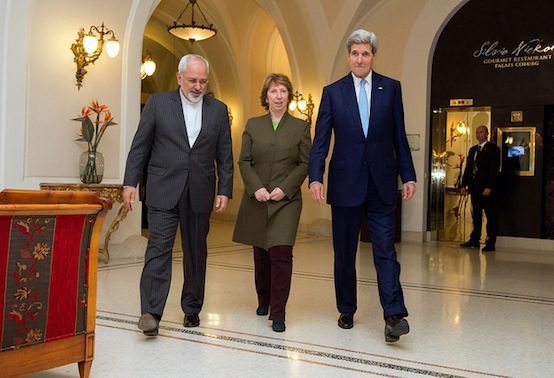Squandering the Opportunity Created by the Nuclear Deal

Philip Stephens notices the odd desire among U.S. political leaders to avoid diplomatic engagement with Iran now that the nuclear deal has been concluded:
There is a curious consensus in Washington that says that now it has persuaded Tehran to trade uranium enrichment for sanctions relief, Iran must be returned to diplomatic isolation. I say curious because the view seems to be shared by supporters as well as opponents of the agreement; and more curious still because it defies the very logic of that accord [bold mine-DL]. What is the argument that says we should bargain with Iran about so strategically vital an issue as nuclear proliferation but then refuse to talk to it about anything else? And this as much of the Middle East burns.
This is very much in line with what Stephen Walt writes this week on the same topic. Walt reasonably wonders why there is such a strong desire to fritter away the potential opening that the deal offers. He notes that deal opponents are already working to do just that:
To be more specific, having secured a landmark agreement rolling back Iran’s nuclear program, a bunch of influential people are now demanding the United States take a variety of steps whose avowed purpose and likely effect will be to keep U.S.-Iranian relations trapped in a spiral of suspicion, demonization, and counterproductive rivalry.
Iran hawks want to change the subject back to their obsession with confronting and “rolling back” Iranian influence, and many deal supporters don’t want to link the deal with anything like rapprochement so as not to appear “weak” on Iran. Hawks are hostile to the deal because it makes it more difficult to sell confrontational policies, but that doesn’t mean they are going to keep trying to sell them whenever possible. In the absence of concerted opposition to that and a sustained effort to pursue engagement on other issues, the hawks may get the U.S. and Iran back on the collision course they have been seeking for many years.
The nuclear deal represents a significant diplomatic success involving a government that the West generally and the U.S. in particular has treated as a pariah for decades, and if it is properly implemented it will be a major advance for the cause of nonproliferation. Considering that the U.S. and Iran have engaged in essentially no direct, high-level diplomacy on a major issue in a generation, the success of these negotiations is all the more extraordinary and important. Considering what the U.S., Iran, and the other members of the P5+1 were able to accomplish in a few years, it would be folly to ignore the potential for engagement to ameliorate at least some of the region’s other problems. If there is a camp inside Iran’s government in favor of reducing Iran’s role in regional conflicts, the U.S. would be irresponsible to ignore that, and it would absurd to pursue policies that strengthen the position of Iranian hard-liners in Tehran. The opportunity that affords the U.S. to pursue a more constructive relationship with Iran is very unusual and likely won’t come again for many years, but it is one that many people on both side of the debate on the nuclear deal seem determined to squander.
One reason for this is that the administration has been desperate to prove that the nuclear deal is not part of a larger detente with Iran for fear that this could reduce support for the deal. To that end, the administration has been throwing weapons at all of Washington’s regional clients to bribe them into acquiescence, endorsing the horrible Saudi campaign in Yemen, and generally “reassuring” despots all over the region that there is no thought of developing a better relationship with Iran. As Stephens and Walt both point out, this is a dead end over the longer term. It is in the interests of both countries to find a modus vivendi that builds on the success of the nuclear negotiations in order to reduce tensions between our governments and to find diplomatic solutions to the region’s conflicts, and right now there are very few in Washington making the case for finding it.
Comments